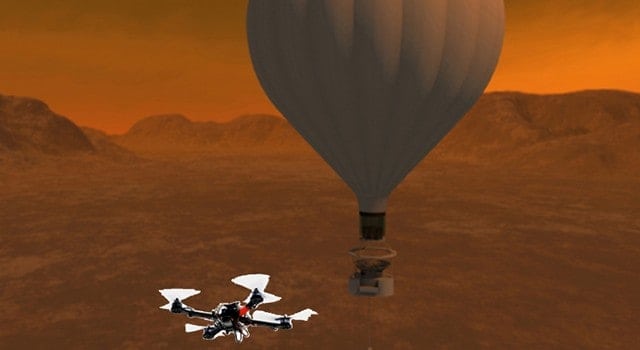NASA has selected 12 proposals, including three from the Jet Propulsion Laboratory, Pasadena, California, for study under Phase I of the NASA Innovative Advanced Concepts (NIAC) Program, which aims to turn science fiction into fact through pioneering technology development.
The selected proposals cover a wide range of imaginative concepts, including:
— a submarine to explore the methane lakes of Titan;
— using neutrinos to perform measurements for the icy moons of the outer planets
— a concept to safely capture a tumbling asteroid, space debris, and other applications.
Seedling investments may provide the breakthrough technologies needed to support NASA’s plans for exploration beyond low-Earth orbit, into deep space and to Mars, as outlined in the Evolvable Mars Campaign.
“The latest NIAC selections include a number of exciting concepts for planetary exploration,” said Michael Gazarik, NASA’s associate administrator for the Space Technology Mission Directorate in Washington. “We are working with innovators around the nation to transform the future of aerospace, while also focusing our investments on concepts to address challenges of current interests both in space and here on Earth.”
NASA’s Space Technology Mission Directorate chose this year’s Phase I proposals based on their potential to transform future aerospace missions by enabling either entirely new missions or breakthroughs in future aerospace capabilities that could accelerate progress toward NASA’s goals.
NIAC Phase I awards are approximately $100,000, providing awardees the funding needed to conduct a nine-month initial definition and analysis study of their concepts. If the basic feasibility studies are successful, proposers can apply for Phase II awards, which provide up to $500,000 for two more years of concept development.
“The 2014 NIAC Phase I candidates were outstanding, which made final selections decisions particularly difficult,” said NIAC Program Executive Jay Falker. “So we considered various kinds of potential benefit and risk, and developed this portfolio to really push boundaries and explore new approaches, which is what makes NIAC unique.”
NASA solicits visionary, long-term concepts for technological maturation based on their potential value to future agency space missions and operational needs. The projects are chosen through a peer-review process that evaluates their potential, technical approach, and benefits for study in a timely manner. All concepts are very early in the development cycle, years from implementation.
NASA’s early investments and partnerships with creative scientists, engineers and citizen inventors from across the nation will provide technological dividends and help maintain America’s leadership in the global technology economy.
The portfolio of diverse and pioneering ideas selected for NIAC awards represent multiple technology areas, including space propulsion, human habitation, science instruments, materials for use in space, and exploring other diverse technology paths needed to meet NASA’s strategic goals.
NIAC is part of NASA’s Space Technology Mission Directorate, which is innovating, developing, testing and flying hardware for use in NASA’s future missions. Over the next 18 months, the directorate will make significant new investments to address several high-priority challenges in achieving safe and affordable deep-space exploration. These focused technology thrust areas are tightly aligned with NASA’s Space Technology Roadmaps, the Space Technology Investment Plan, and National Research Council recommendations.
The selections support three of eight key STMD technology thrust areas: advanced life support and resource utilization, space robotic systems, and space observatory systems. Additionally the concepts selected here support broader investments efforts in NASA’s Asteroid Initiative and outer planetary missions.
For a complete list of the selected proposals and more information about the NIAC, visit:
For more information about NASA’s investments in space technology and the agency’s Space Technology Mission Directorate, visit:
If our reporting has informed or inspired you, please consider making a donation. Every contribution, no matter the size, empowers us to continue delivering accurate, engaging, and trustworthy science and medical news. Independent journalism requires time, effort, and resources—your support ensures we can keep uncovering the stories that matter most to you.
Join us in making knowledge accessible and impactful. Thank you for standing with us!

